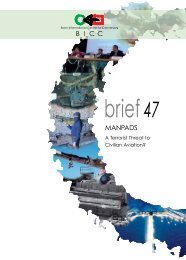egypt-final-presidential-elections-2012
egypt-final-presidential-elections-2012
egypt-final-presidential-elections-2012
Create successful ePaper yourself
Turn your PDF publications into a flip-book with our unique Google optimized e-Paper software.
The Carter Center<br />
Counting and Aggregation<br />
For both rounds of Egypt’s <strong>presidential</strong><br />
election, counting was<br />
conducted at the end of polling<br />
on the second day at the polling-station<br />
level, and the results then were aggregated<br />
at the DGC level before being<br />
transmitted to the PEC’s Cairo headquarters.<br />
Presiding judges were required to<br />
announce the results at the conclusion of<br />
counting and to provide each candidate’s<br />
agent present with a signed copy of the<br />
results. In between the first and second<br />
rounds, the legislature added the additional<br />
requirement that presiding judges<br />
at the DGC level provide a stamped copy<br />
of the aggregated results to candidate<br />
agents present. Providing polling-station<br />
and general committee-level results to candidates’<br />
agents promoted transparency and helped to instill<br />
confidence in the <strong>final</strong> results by ensuring that agents<br />
had verifiable information regarding electoral results<br />
in their jurisdictions.<br />
The major findings from<br />
these polling stations during<br />
counting were:<br />
Procedural Irregularities in<br />
Counting and Aggregation:<br />
Procedural irregularities in<br />
counting and aggregation<br />
during the first round of the<br />
<strong>presidential</strong> election were<br />
witnessed in roughly onequarter<br />
of polling stations.<br />
During the second round,<br />
the number of procedural<br />
irregularities rose; there were<br />
procedural irregularities noticed in roughly one-third<br />
of polling stations visited. However, during both<br />
rounds, these irregularities were mostly minor in<br />
Poll workers count ballots after polls close on June 17, <strong>2012</strong>.<br />
In some cases, it was reported that<br />
the judges presiding over the polling<br />
stations appeared to have varying<br />
interpretations of what constituted an<br />
invalid ballot, including interpretations<br />
that appeared to deviate from the law<br />
and PEC instructions.<br />
nature, not affecting the accuracy of the count.<br />
The poor implementation of procedures for<br />
ballot reconciliation (including failing to account<br />
for spoiled ballots in some cases) and inconsistencies<br />
in the determination<br />
of invalid and valid votes<br />
were among the more<br />
common errors witnessed.<br />
At several stations, witnesses<br />
reported that candidate<br />
agents, domestic witnesses,<br />
or security officials were<br />
actively participating in the<br />
counting process, a worrying<br />
encroachment on the roles<br />
and independence of the<br />
officials charged with administering<br />
the election. Again,<br />
in instances witnessed by<br />
The Carter Center, this interference did not appear<br />
to unduly affect the accuracy of the count. However,<br />
irregularities such as these may still be potentially<br />
Maurice Chammah<br />
58



